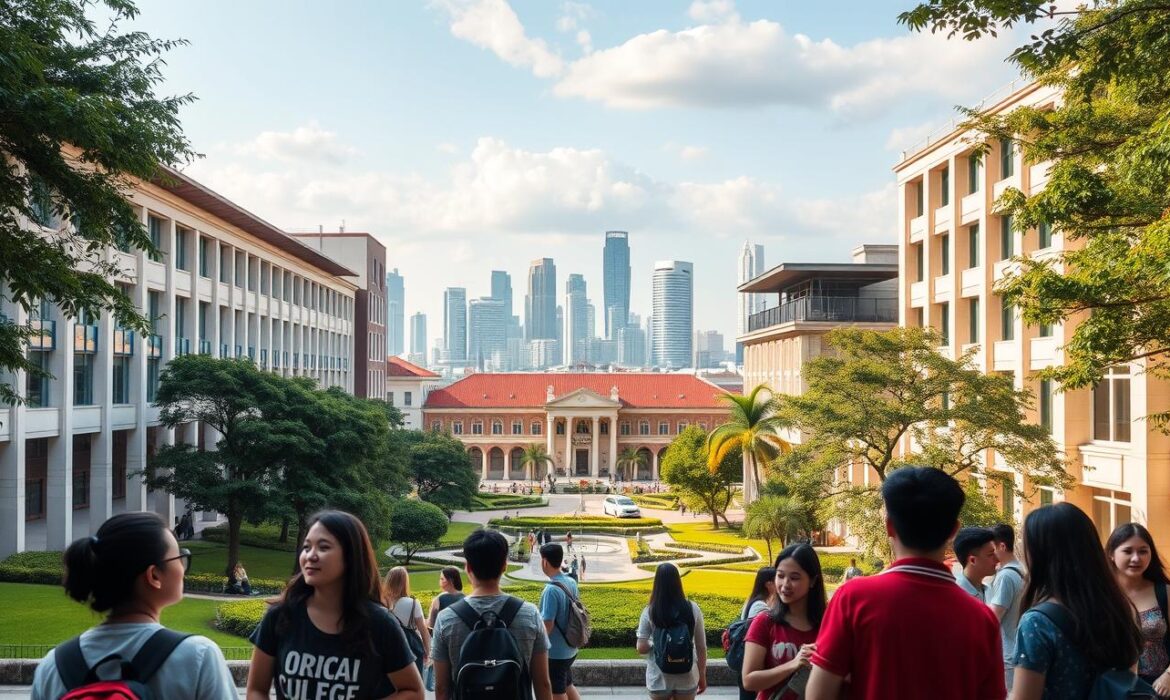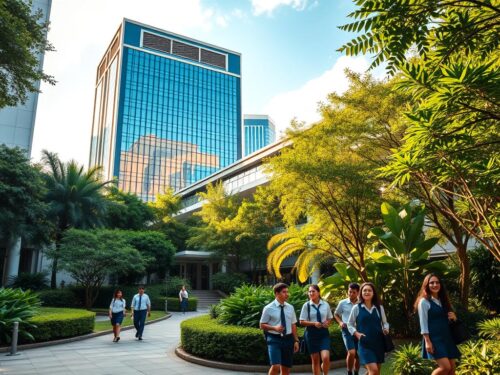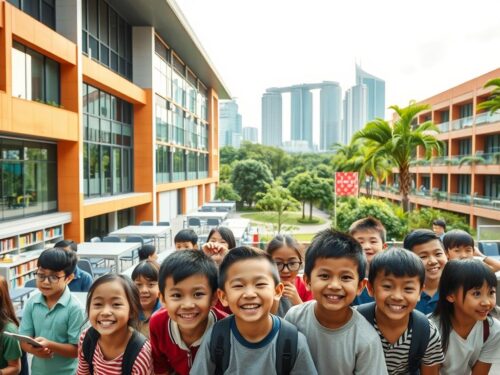Choosing the right junior college can shape a student’s future. In Singapore, these institutions are known for rigorous programmes and strong university pathways. The competitive landscape demands careful evaluation of academic excellence, unique offerings, and student support systems.
Rankings now consider factors beyond grades, including Rank Points (RP) and specialised curricula. Schools with creative programmes or language mastery initiatives, like those supported by Creative Campus, stand out. This guide breaks down key metrics to help families make informed decisions.
Key Takeaways
- Junior colleges play a crucial role in university admissions.
- 2024 rankings evaluate both academic performance and student life.
- RP scores and cut-off points are essential decision tools.
- Specialised programmes enhance learning opportunities.
- Language support contributes to overall success.
Introduction to Junior Colleges in Singapore
Junior colleges serve as a bridge between secondary education and university studies. These two-year institutions focus solely on academic preparation, unlike polytechnics that blend vocational training. Students aiming for local or global universities often choose this path for its structured curriculum.
Admission hinges on the L1R5 scoring system, which tallies grades from six subjects. Lower scores mean better chances at top-tier schools. The Ministry of Education (MOE) updates criteria yearly—2024 brings revised subject requirements and bonus points for language mastery.
How does this differ from other pathways? Polytechnics offer hands-on courses, while the International Baccalaureate (IB) provides a broader global focus. Junior colleges emphasize depth in core subjects like math and sciences, tailored for university readiness.
Key factors to consider when selecting a junior college:
- Academic streams: Science, arts, or hybrid options.
- Co-curricular activities (CCAs): Leadership and talent development.
- Special programmes: Bilingual tracks or research opportunities.
With MOE’s 2024 updates, students can now earn bonus points for advanced language courses. This shift highlights Singapore’s commitment to nurturing well-rounded scholars.
Top 5 Best JCs in Singapore (2024 Rankings)
Singapore’s top junior colleges set the benchmark for academic rigor and holistic development. The 2024 rankings reflect institutions that excel in both grades and innovative programs, helping students thrive in competitive environments.
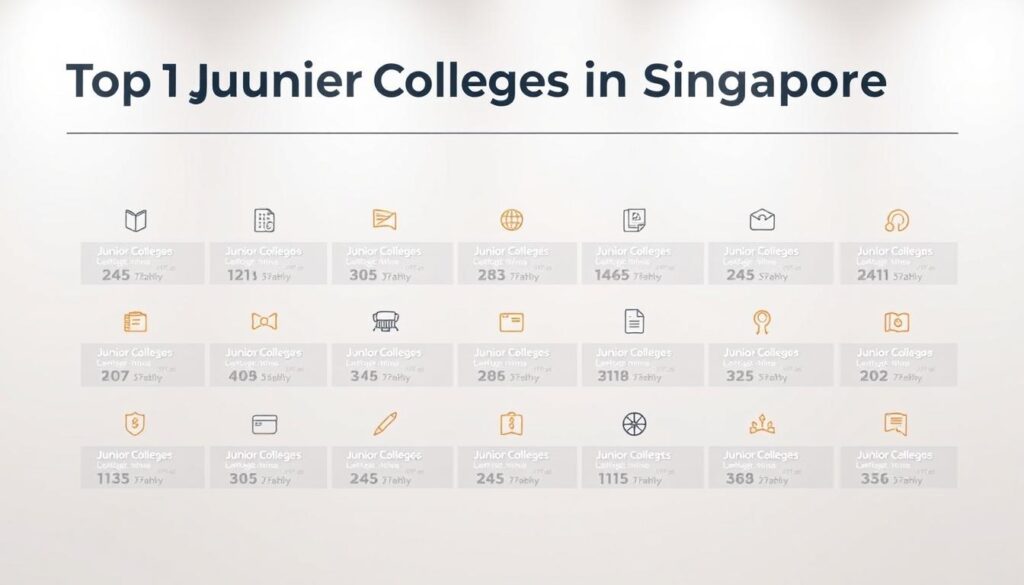
Raffles Institution (RI)
Raffles Institution leads with a median Rank Point (RP) of 88, and 33% of its cohort achieves 90 RP. Its Global Programs, like the Bi-cultural China focus, prepare students for international opportunities. The school’s emphasis on critical thinking sets it apart.
Hwa Chong Institution (HCI)
With a mean RP of 85, Hwa Chong Institution combines tradition with innovation. The Computing Talent Programme nurtures tech-savvy learners, while its bilingual curriculum reinforces language mastery. Academic excellence here is paired with leadership development.
Nanyang Junior College (NYJC)
NYJC’s MSLO leadership framework and 84.2 mean RP highlight its balanced approach. Students benefit from tailored mentorship and a culture that values both subjects and soft skills. Its vibrant campus life adds to the appeal.
Victoria Junior College (VJC)
VJC stands out with 12% of its cohort scoring perfect RPs. The Drama Elective Programme fosters creativity, while STEM tracks deliver strong results. This blend of arts and sciences caters to diverse interests.
Eunoia Junior College (EJC)
Despite its newer status, Eunoia Junior College impresses with its Passion Pursuit curriculum. Flexible learning paths and interdisciplinary programmes allow students to explore their interests deeply, making it a rising star.
JC Rankings by Cut-Off Points (2024)
2024’s cut-off trends reveal shifting priorities for science and arts aspirants. These thresholds determine eligibility for specific streams, reflecting each school’s competitiveness. Below, we break down the latest data and rules to help students strategize.
Science Stream Cut-Off Points
Top-tier institutions like Raffles Institution and Hwa Chong Institution maintain strict science stream thresholds (
Arts Stream Cut-Off Points
Arts streams are slightly more accessible, with cut-offs ranging from 5 to 12. For example, TMJC’s arts program admits students with L1R5 ≤12, offering flexibility for creative learners.
| School | Science Stream (L1R5) | Arts Stream (L1R5) |
|---|---|---|
| Raffles Institution | ≤4 | ≤5 |
| Eunoia Junior College | ≤6 | ≤8 |
| TMJC | ≤10 | ≤12 |
Key Notes:
- L1R5 computes grades from six subjects (lower = better). Bonus points apply for language mastery.
- Conditional admission requires L1R5 ≤15. Absent grades may disqualify applicants.
Academic Performance: Median and Mean Rank Points
Rank Points (RP) serve as a critical benchmark for evaluating junior college performance. These metrics reflect both individual achievement and institutional rigor, helping students and parents compare schools objectively. The 2024 data highlights clear leaders, with Raffles Institution and Hwa Chong Institution setting the pace.
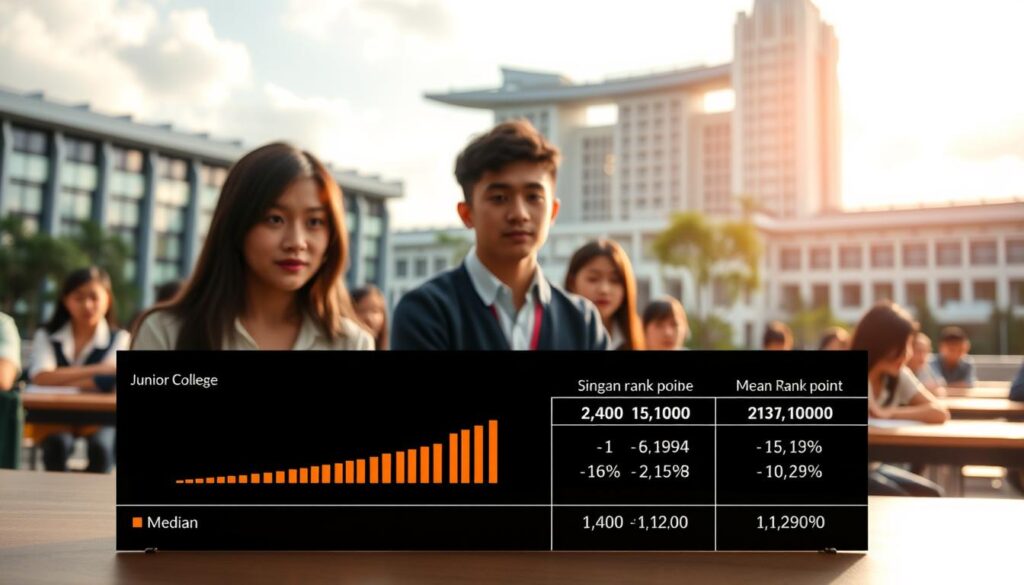
Raffles Institution and Hwa Chong Institution
RI dominates with a median RP of 88, while 33% of its cohort achieves the perfect 90 RP. Its Gifted Education Programme fosters deep mastery of core subjects, contributing to these standout scores. HCI follows closely with an 85 mean RP, bolstered by specialized tracks like its Computing Talent Programme.
Other Top-Performing Junior Colleges
NYJC’s 84.2 mean RP outpaces VJC’s 82.6, attributed to its mentorship-driven approach. Meanwhile, SAP schools like Dunman High excel in bilingual academic excellence, while merged colleges (e.g., ASRJC) show rapid improvement in RP trends.
Key insights about RP calculations:
- The formula combines grades from three H2 and one H1 subjects, plus General Paper.
- Perfect scorers often benefit from bonus points in language or research modules.
- Creative Campus reports an 80% distinction rate in GP, underscoring its impact on RP outcomes.
Unique Programs and Strengths of Each JC
Beyond academics, Singapore’s leading junior colleges offer distinctive programs that shape well-rounded scholars. These initiatives—from research attachments to interdisciplinary modules—equip students with skills beyond textbooks.
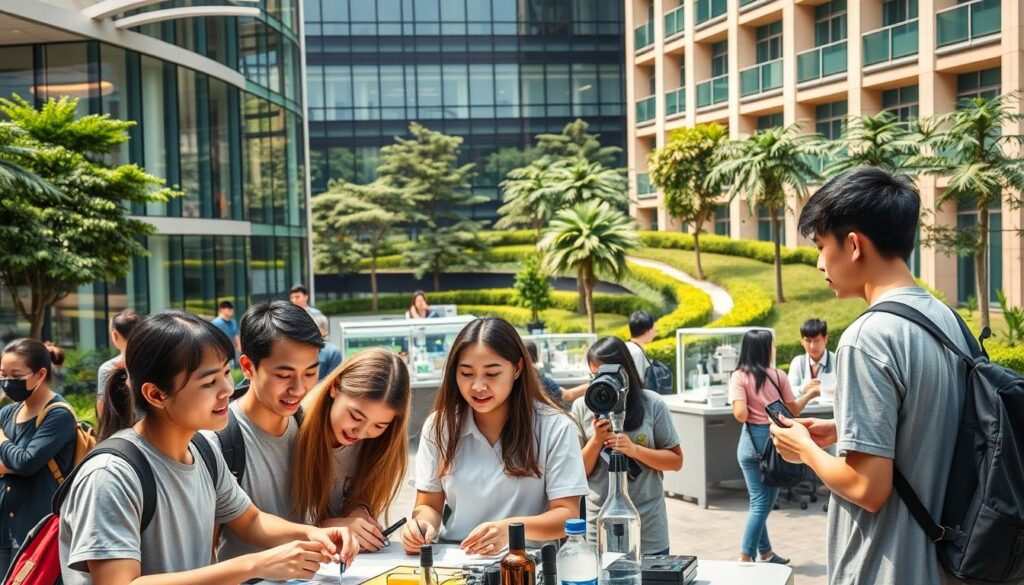
Raffles Institution’s Global Programs
Raffles Institution excels with its Humanities elective programme, blending regional studies with overseas research opportunities. Students explore topics like Southeast Asian politics through fieldwork, gaining real-world perspectives.
The school’s Global Perspectives track also integrates core subjects with international collaborations, preparing learners for cross-cultural challenges.
Hwa Chong’s Bicultural Focus
Hwa Chong Institution stands out with its Bicultural Studies Programme, featuring immersive exchanges in China. This elective programme strengthens bilingual mastery while deepening understanding of Asian economies.
Its Computing Talent Programme further complements traditional subjects, merging tech innovation with arts and sciences for a holistic approach.
Eunoia’s Innovative Curriculum
Eunoia Junior College redefines learning through GLIDE, an interdisciplinary programme linking humanities with sciences. Students tackle projects like urban sustainability, applying classroom theory to societal issues.
Flexible pathways allow tailoring subjects to individual passions, from music to robotics, fostering creativity alongside academic rigor.
Other notable programs include VJC’s VSMART research track for STEM enthusiasts and NYJC’s Galileo camps, which blend leadership training with community projects. Each college crafts unique opportunities to nurture tomorrow’s leaders.
Co-Curricular Activities (CCAs) and Student Life
A well-rounded education extends beyond the classroom, with co-curricular activities shaping student growth. These programs build leadership, creativity, and teamwork, complementing academic rigor. Schools like VJC and RI integrate CCAs into their ethos, ensuring holistic development.
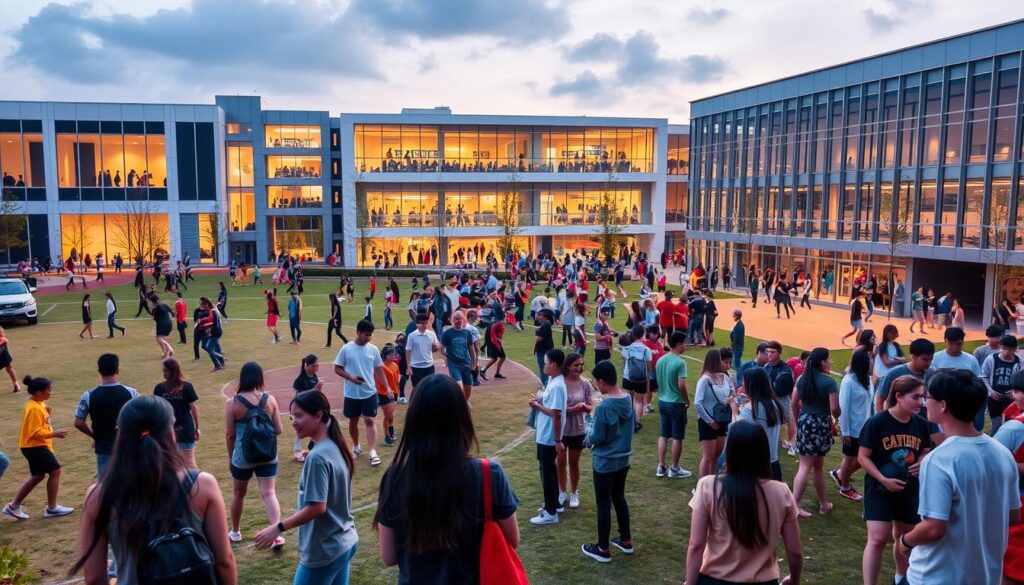
Leadership and Community Service
Top junior colleges emphasize service learning, requiring students to complete community projects. RI’s Debate Society and HCI’s Robotics Club nurture critical thinking, while EJC’s Passion Pursuit program links activities to real-world impact.
Service-based CCAs also offer bonus points for university applications. For example, NYJC’s environmental initiatives and VJC’s peer mentoring schemes strengthen portfolios. These experiences prepare students for global citizenship.
Arts and Sports Opportunities
Creative and athletic activities thrive in junior colleges. VJC’s award-winning choir and DHS’s Music Elective Programme highlight excellence in the arts. Meanwhile, TJC’s state-of-the-art sports arena contrasts with EJC’s flexible collaborative spaces, catering to diverse interests.
| School | Notable CCA | Facility Highlight |
|---|---|---|
| Raffles Institution | Debate Society | Dedicated moot court |
| Hwa Chong Institution | Robotics Club | AI lab with 3D printers |
| Victoria JC | Choir | Acoustic rehearsal rooms |
Participation in sports like basketball or badminton fosters discipline, while arts programs unlock creative potential. Many colleges offer scholarships for standout performers, bridging talents to university pathways.
How to Choose the Right JC for You
Selecting the ideal junior college requires balancing academic aspirations with personal preferences. With 70-80% of Creative Campus students achieving A/B grades, strategic planning becomes crucial. This guide helps navigate key decision factors from subject combinations to campus culture.
Aligning Academic Goals
University prerequisites should guide subject choices. Science-focused students might prioritize schools like RI with strong lab facilities, while arts aspirants could favor VJC’s drama programme.
Calculate your likely L1R5 score against 2024 cutoffs. A realistic assessment prevents disappointment while keeping competitive options open. Consider:
- Core courses required for your target degree
- Elective availability (e.g., H2 Computing)
- Special programmes that boost university applications
Considering Location and Culture
Daily commute time impacts CCA participation and study routines. Schools like EJC offer residential options for distant students, while urban campuses provide easier access to libraries.
Campus culture varies significantly – RI’s high-pressure environment contrasts with NYJC’s collaborative approach. Attend open houses to assess:
- Teaching styles and faculty rapport
- Facilities matching your interests (e.g., robotics labs)
- Alumni networks in your preferred industry
Remember, the right school fosters both academic growth and personal development. Prioritize institutions where you’ll thrive across all aspects of college life.
Conclusion
Your junior college journey shapes academic and personal growth. Prioritize schools aligning with your goals—whether through rigorous programmes, vibrant CCAs, or convenient locations. Early preparation for cut-off points and mastering English boosts success in General Paper.
Strategize JAE applications by combining reach and safety schools. Explore skill-building options like Creative Campus’ trial classes to sharpen strengths. Remember, the right junior college fosters both excellence and confidence.
Start visiting campuses, talk to current students, and trust your instincts. Your path to success begins with informed choices today.

